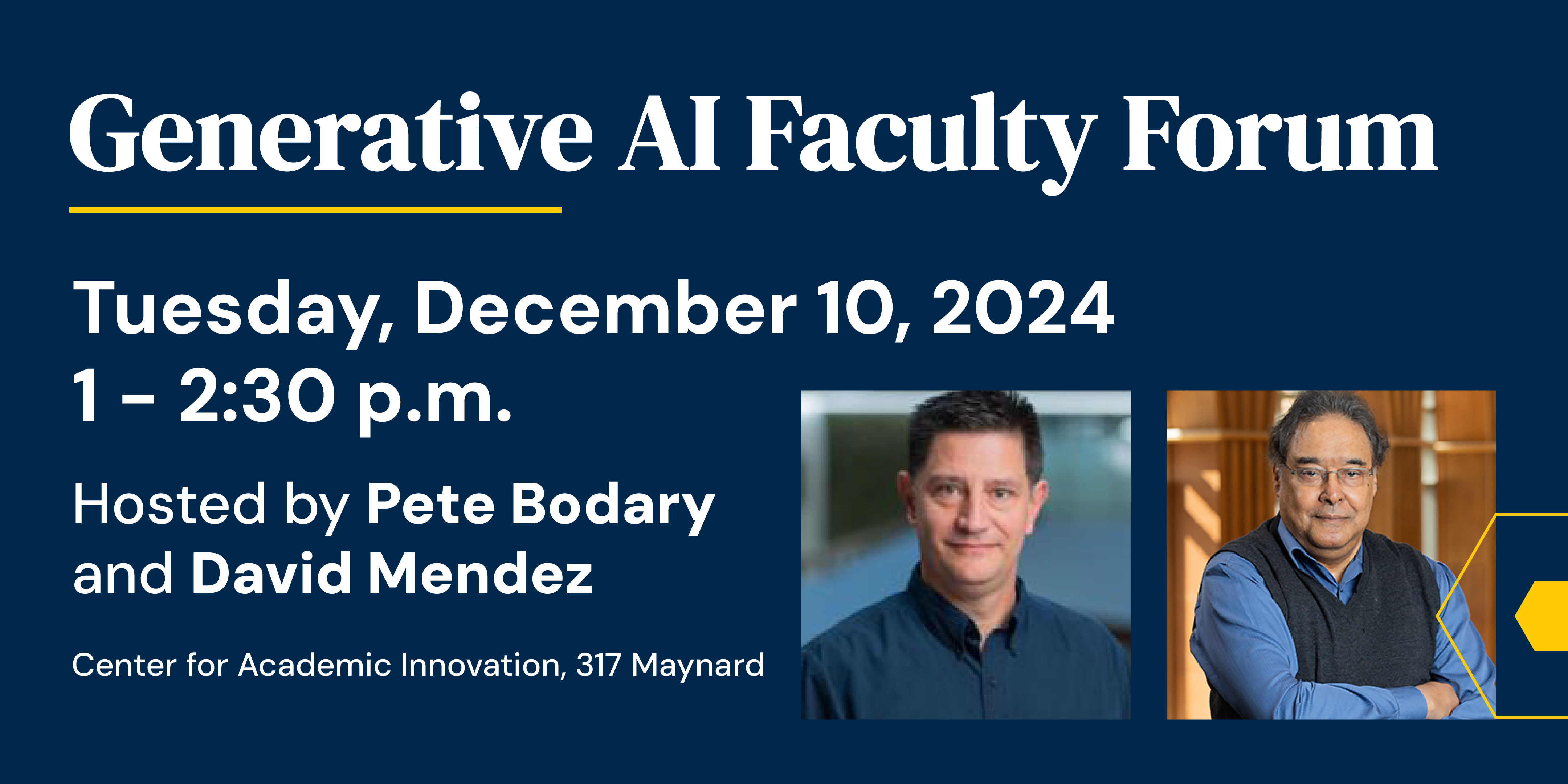Generative AI Faculty Forum
Date & Time
December 10, 2024, 1:00 PM - December 10, 2024, 2:30 PMLocation
Center for Academic Innovation – 317 Maynard Street
 Register Now
Register Now
It’s been nearly two years since the public release of Generative Artificial Intelligence (GenAI) in the form of ChatGPT and its resulting impact on life in higher education. We invite U-M faculty to join their colleagues on December 10 from 1-2:30 p.m., to discuss how you and your peers are leveraging GenAI in your everyday work.
Pete Bodary, associate dean for undergraduate education at the School of Kinesiology, and David Mendez, professor of health management and policy at the School of Public Health, will host the conversation.
Join us in person at the Center for Academic Innovation on 317 Maynard St. to:
-
Share your experiences: Talk about your successes and challenges using GenAI for teaching, research, and administrative activities.
-
Learn from colleagues: Gain insights and best practices from colleagues across the university. Hear about barriers they face that are preventing them from incorporating GenAI into their work.
-
Discuss creating an ongoing Generative AI Faculty Forum: Explore the creation of a persistent space for like-minded faculty to share their experiences leveraging GenAI across teaching, research, and administrative work.
In addition to hearing from colleagues directly about their experiences leveraging GenAI, we will use this meeting to explore the creation of a cross-institutional GenAI Faculty Interest Forum. Its purpose is to establish a platform for sharing information about GenAI and learning from one another. We envision that the discussions will cover a wide range of important questions, such as:
-
What are the current GenAI tools, should we use them, and if so, how do we use them?
-
What are the best practices for GenAI in teaching, research, and administrative processes?
-
What is the likely future of GenAI, and more generally, AI, and what are its implications for the academy and society?
-
How is GenAI affecting, and how is it likely to affect, our respective academic disciplines?
-
What should we teach our students to help them become skilled members of a society that effectively employs GenAI?
-
What are the implications of using GenAI in the creation of knowledge?
-
What potential synergies and collaborations across disciplines, facilitated by GenAI, can we envision?
We hope that this forum will foster a robust GenAI conversation among U-M faculty, prevent the formation of silos in GenAI use and knowledge, and reduce disparities among academic units regarding GenAI.
About Pete Bodary
Dr. Pete Bodary is a clinical associate professor of applied science and movement science and associate dean of undergraduate education at the School of Kinesiology. Dr. Bodary has taught more than 10 courses and received the School of Kinesiology Excellence in Teaching award in 2009, 2017, 2018, 2020, and 2022. Prior to U-M, Dr. Bodary was an assistant professor at Wayne State University after completing his Ph.D. in exercise science at the University of South Carolina.
About David Mendez
Dr. David Mendez is a Professor in the Department of Health Management and Policy at the School of Public Health and the Technology and Operations Area at the Ross School of Business. He is also the UM PI for the Center for the Assessment of Tobacco Regulations [CAsToR].
His research focuses on modeling the public health impact of potential tobacco and nicotine product regulations. Professor Mendez teaches survey courses in management science at the School of Public Health and the Ross School of Business. He holds a PhD in Management Science, an MS in Operations Research / Systems Science, and an MS in Applied Statistics, all from Michigan State University.
The University of Michigan Center for Academic Innovation is committed to a future in which education connects and empowers all learners to reach their full potential throughout their lives. We collaborate across campus and around the world to create equitable, lifelong educational opportunities for students and learners everywhere. Our work spans curricular innovation, tools for student success and equity, educational research and analytics, and academic innovation policy.